42 identify all forces acting on the object and draw the free-body diagram.
We must draw a separate free-body diagram for each object in the problem. A free-body diagram is a useful means of describing and analyzing all the forces that act on a body to determine equilibrium according to Newton's first law or acceleration according to Newton's second law. by W Moebs · 2016 — To draw a free-body diagram, we draw the object of interest, draw all forces acting on that object, and resolve all force vectors into x– and y-components.
The strategy for identifying all the interactions and then identifying all the forces (and the direction of those forces) is to construct a "free body" diagram. A free body diagram considers the body to be free of the rest of the environment, with all interactions on the body replaced by each of the forces acting on it. There are often numerous ...

Identify all forces acting on the object and draw the free-body diagram.
Free body diagrams do not need to be drawn to scale but it can sometimes be useful if they are. It is important to label each arrow to show the magnitude of the force it represents. The type of force involved may also be shown. ... An object may have several different forces acting on it, which ... February 14, 2014 - In order to continue enjoying our site, we ask that you confirm your identity as a human. Thank you very much for your cooperation Find step-by-step Physics solutions and your answer to the following textbook question: For the problem, identify all the forces acting on the object and draw a free-body diagram of the object. An ascending elevator, hanging from a cable, is coming to a stop..
Identify all forces acting on the object and draw the free-body diagram.. How to draw free body diagram. Step 1: Draw the object with no extra features. Step 2: Identify the forces acting on the box. The box has mass, so it should also have weight, and a force acting downward. Because the stationary box is on a surface, there is a normal force that acts perpendicular to the surface. Identify all forces acting on the object and draw the free-body diagram. Draw the force vectors with their tails at the dot. The orientation of your vectors will be graded. The exact length of your vectors will not be graded but the relative length of one to the other will be graded. object by using your hand to give either object an acceleration; that is, try to change the objects velocity. 11. Free-Body Diagram Draw a free-body dia-gram of a bag of sugar being lifted by your hand at a constant speed. Specifically identify the system. Label all forces with their agents and make the arrows the correct lengths. 12. combination of all the forces acting on an object 5N 5N 5N 5N 5N 10 N Net Force = 10N East ... Draw a free-body diagram. (Neglect air friction) The force of gravity is the only force described. (no air resistance). Problem 8 A car runs out of gas and is coasting down a hill.
It is for this instant that you indicate the forces acting on the body and its acceleration. For instance, imagine you will push a massive block across a table. You could draw free body diagram for the block before you start to push, while you are pushing but the object is not yet moving, or ... Ask any question and get an answer from our subject experts in as little as 2 hours. here in discussion, we have to call brother free body diagram of our rocket, why it is on the launch pad. And in the second case we have to draw the free body diagram. Oh the rocket in which we have to show the forces while it is flying. So first of all, we are going to draw the free body diagram. The motion of objects is determined by the relative size and the direction of the forces that act upon it. Free-body diagrams showing these forces, their direction, and their relative magnitude are often used to depict such information. In this Lesson, The Physics Classroom discusses the details ...
Draw a free-body diagram of a bag of sugar being lifted by your hand at a constant speed. Specifically identify the system. Label all forces with their agents and make the arrows the correct lengths. For the steps and strategies involved in solving a similar problem, you may view a Video Tutor Solution. Review I Constants I Periodic Table Part A Identify all forces acting on the object and draw the free-body diagram. Draw the vectors starting at the black dot. The location and orlentation of the vectors will be graded. The acceleration of an object is directly proportional to the net external force acting on the object and inversely proportional to the mass of the object. ... In a free-body diagram of an object, why are forces exerted by the object not included in the diagram? ... Draw the free-body diagram 3. Draw the arrows along with labeling them. Draw a free-body diagram for the system. B. Identify all the forces acting on the car. i. normal force. ii. weight. iii. drag. iv ...1 answer · Top answer: Given Car is accelerating to the right from a stop (a) The free-body diagram is shown as below: Free body diagram (B) Forces that are acting...
Your car is accelerating to the right from a stop. Identify all forces (normal, weight, friction, drag) acting on the object and draw the free-body diagram.

Free Body Diagrams Free Body Diagrams Are Pictures That Show The Size And Direction Of All Forces Acting On An Object Ppt Download
A free body diagram is defined as an illustration that depicts all the forces acting on a body, along with vectors that are applied by it on the immediate environs. Apart from the acting forces and subsequent work done, the moment magnitudes are also considered to be a part of such diagrammatic representations.
Transcribed image text: Identify all forces acting on the object and draw the free-body diagram. Draw the force vectors with their tails at the dot.
May 21, 2017 - Brainly.in is a part of the largest social network for studying in a group. We provide the best tools for mutual help with school subjects. Join us!
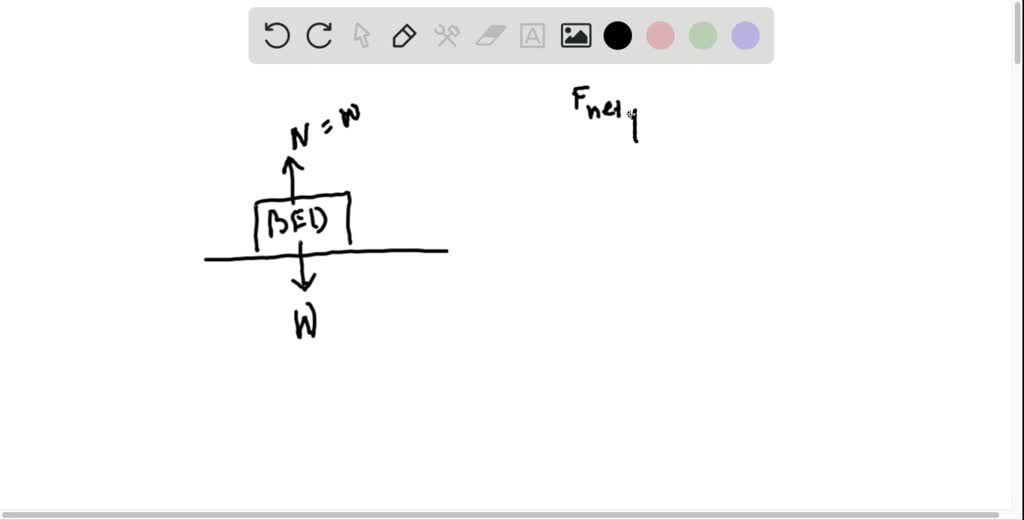
Solved Ramon Pushes On A Bed That Has Been Pushed Against A Wall As In Figure 4 17 Draw A Free Body Diagram For The Bed And Identify All The Forces Acting On It
in this problem, we are given an object. We are asked to identify all of the forces acting on the object and draw a free body diagram for it. So in this case, we have a car is getting to a stop from a high speed. So the car is moving along the road like that.
A free-body diagram is a representation of an object with all the forces that act on it. The external environment (other objects, the floor on which the object sits, etc.), as well as the forces that the object exerts on other objects, are omitted in a free-body diagram. Below you can see an example of a free-body diagram:

In Each Case Identify Any Two Force Members And Then Draw The Free Body Diagrams Of Each Member Of The Frame Study Com
A force is a push or pull acting upon an object as a result of its interaction with another object. There are a variety of types of forces. Previously in this lesson, a variety of force types were placed into two broad category headings on the basis of whether the force resulted from the contact or non-contact of the two interacting objects.
Transcribed image text: Drawing a free-body diagram Identify all forces acting on the object. This step was described in Tactics Box 5.2. Draw a coordinate system. Use the axes defined in your pictorial representation. If those axes are tilted, for motion along an incline, then the axes of the free-body diagram should be similarly tilted.
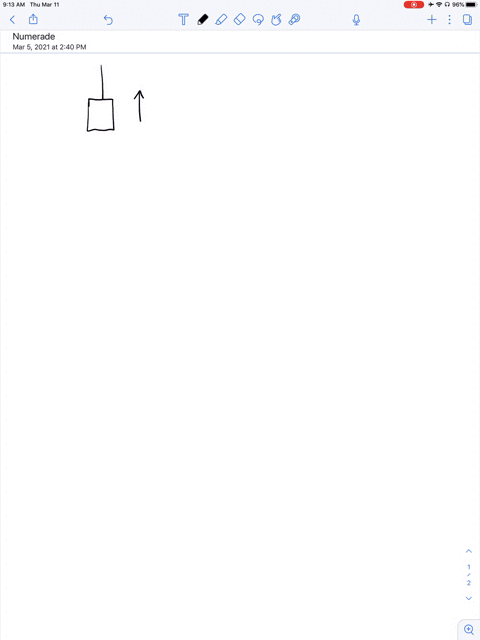
Solved For Each Problem Identify All The Forces Acting On The Object And Draw A Free Body Diagram Of The Object A Box Is Being Dragged Across The Floor At A Constant Speed By
A free-body diagram is a sketch of only the object in question and the forces acting upon it. While this could still be a sketch, the emphasis is on the forces, so they must be drawn accurately. While system diagrams are useful in helping us understand the problem at hand, free-body diagrams ...
The free body diagram helps you understand and solve static and dynamic problem involving forces. It is a diagram including all forces acting on a given object without the other object in the system. You need to first understand all the forces acting on the object and then represent these force by arrows in the direction of the force to be drawn.
Worksheet #1 Free Body or Force diagrams Drawing Free-Body Diagrams Free-body diagrams are diagrams used to show the relative magnitude and direction of all forces acting upon an object in a given situation, A free-body diagram is a special example of the vector diagrams; these diagrams will be used throughout your study of physics.
A free-body diagram is a visual representation of an object and all of the external forces acting on it, so to draw one you'll have to have this information calculated. They are very important for working in engineering or physics problem solving since drawing them helps you to understand what is going on in a problem.
FREE Expert Solution. The weight acts downward. The normal force acts upward. 90% (64 ratings) Problem Details. Your car is accelerating to the right from a stop. Identify all forces acting on the object and draw the free-body diagram. Draw the force vectors with their tails at the dot. Frequently Asked Questions.
Identify all Forces. Vita August 12, 2012 General Physics 0 Comments 3139 views. Your physics textbook is sliding to the right across the table. Identify all forces acting on the object and draw a free-body diagram. Your physics textbook is sliding to the right across the table.

Draw A Free Body Diagram Fbd To Show Various Forces Acting On A Body Which Is Sliding On An Brainly In
To draw a free-body diagram use the following steps: Isolate the object of interest. It is customary to represent the object of interest as a point in your diagram. Identify all the forces acting on the object and their directions. Do not include forces acting on other objects in the problem. Also, do not include quantities, such as velocities ...
Draw a free body diagram ... Identify all the forces and show a free-body diagram. Thrust, F⃗ thrust Kinetic friction force, f⃗ k ... At this moment, what can we say about the frictional force acting on the box of cereal? There is a static frictional force pointing in the box's direction of motion, parallel to the conveyer belt. ...
2. Drawing free-body diagram, the steps. Draw a picture of the situation, that is the motion diagram, Isolate the system (the object) of interest by drawing a closed curve around, Identify all forces acting on the object, Draw a coordinate system (x, y, z) axis, Represent the object as a dot at the origin of the coordinate axes, Draw vectors ...
Answer to Identify all forces acting on the object and draw the free-body diagram. Draw the vectors starting at the black dot. The...
A free body diagram is used to calculate static and dynamic forces acting on an object. In other words, a free body diagram is the starting point to develop a mathematical model to find and calculate various forces acting on a body. The purpose of the free body diagram is to simplify the situation for easy analysis. Figure :1.
identify the forces acting on an object? A. Draw a closed curve around the system. B. Identify "the system" and "the environment". C. Draw a picture of the situation. D. All of the above. E. None of the above.
So my question to you is, pause this video, and think about what are all of the forces that are acting on this block? All right, now let's work through this together. And to do it, I'm going to draw what's known as a free-body diagram to think about all of the forces.
September 19, 2016 - The first step in describing and analyzing most phenomena in physics involves the careful drawing of a free-body diagram. Free-body diagrams have been used in examples throughout this chapter. Remember that a free-body diagram must only include the external forces acting on the body of interest.
a Draw a free body diagram of the piston labelling all forces acting on it b At from PHYS 153 at University of British Columbia
To draw a free-body diagram, we draw the object of interest, draw all forces acting on that object, and resolve all force vectors into x– and y-components.
Free Body Diagrams (FBD) are useful aids for representing the relative magnitude and direction of all forces acting upon an object in a given situation. The first step in analyzing and describing most physical phenomena involves the careful drawing of a free-body diagram.
Drawing Free-Body Diagrams. Free-body diagrams are diagrams used to show the relative magnitude and direction of all forces acting upon an object in a given situation. A free-body diagram is a special example of the vector diagrams that were discussed in an earlier unit. These diagrams will be used throughout our study of physics.
May 24, 2009 - Topperlearning is an edusite for CBSE, ICSE, Maharashtra & Gujarat boards for K-12, JEE & NEET coaching. We also have NCERT, Selina & other textbook solutions, video lessons by academic experts & past years' papers.
Solved: For the problem, identify all the forces acting on the object and draw a free-body diagram of the object. A skydiver has his parachute open and is floating downward through the air at a constant speed. - Slader
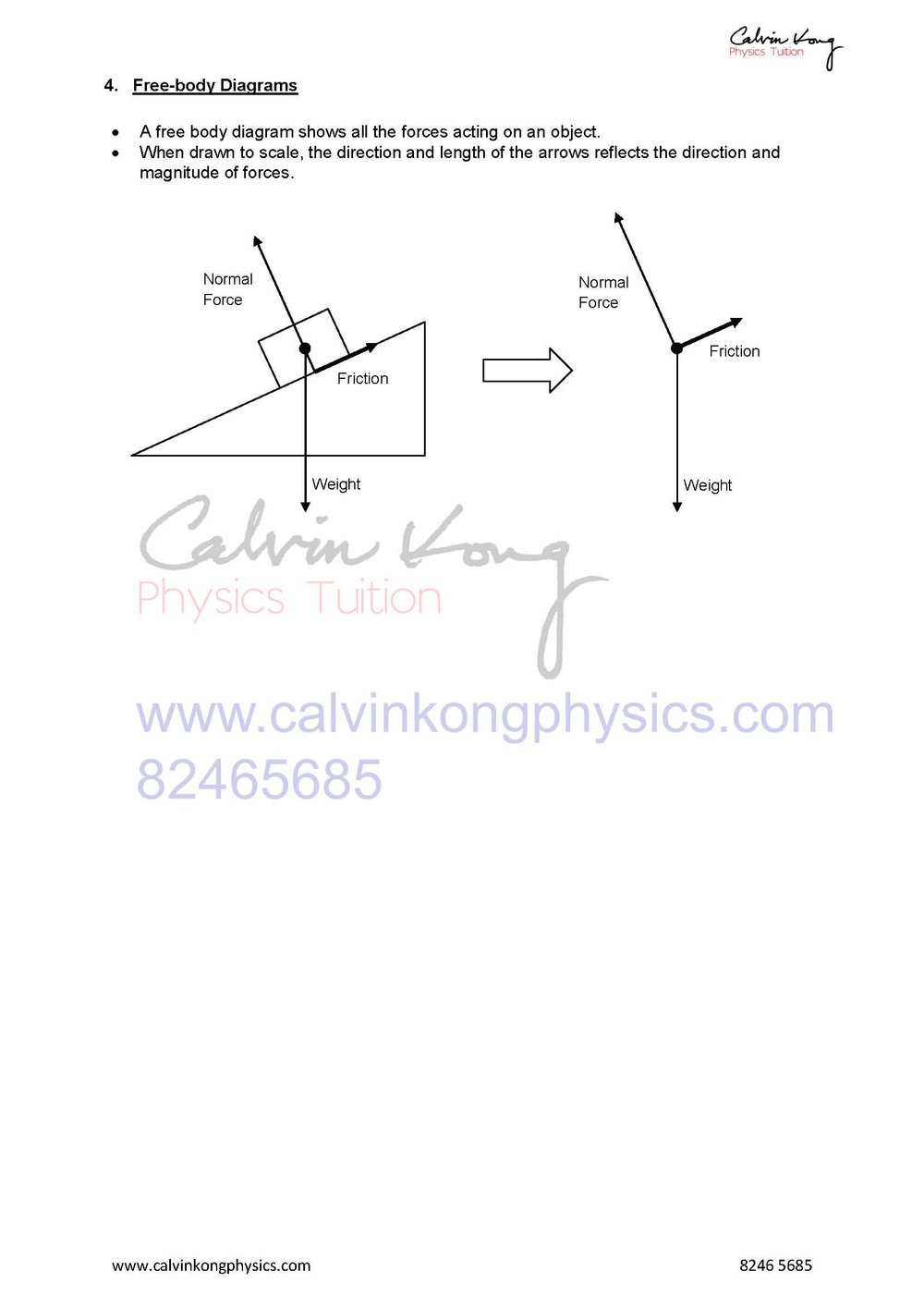
3 4 Types Of Forces And Free Body Diagrams Physics Tuition Centre O Level A Level And Integrated Programme Ip
Identify all of the forces acting on a body. ... For every force acting on that object (we don't care about forces acting on any other objects), draw a ...
Force And Free Body Diagrams Physics Force The Push Or Pull On A Body That Causes A Mass To Accelerate Formula Open File Equation Force Png Free Body Diagrams Fbd Free Body Diagrams Are Diagrams Used To Show The Relative
Solved: For the problem, identify all the forces acting on the object and draw a free-body diagram of the object. Your car is skidding to a stop from a high speed. - Slader
Free body diagram, A diagram showing the forces acting on the object. ... After we have identified the contact forces, draw a dot to represent the object we ...

Draw A Free Body Diagram Fbd To Show Various Forces Acting On A Body Which Is Sliding On An Brainly In
a Draw a free body diagram identifying all the forces acting on Froome and the from PHY 121 at Tufts University

Your Car Is Accelerating To The Right From A Stop Identify All Forces Normal Weight Friction Drag Acting On The Object And Draw The Free Body Diagram Study Com
Identify all forces acting on the object and draw the free-body diagram. Draw the vectors starting at the black dot. The location and orientation of the vectors will be graded. The exact length of your vectors will not be graded but the relative length of one to the other will be graded.
Find step-by-step Physics solutions and your answer to the following textbook question: For the problem, identify all the forces acting on the object and draw a free-body diagram of the object. An ascending elevator, hanging from a cable, is coming to a stop..
February 14, 2014 - In order to continue enjoying our site, we ask that you confirm your identity as a human. Thank you very much for your cooperation
Free body diagrams do not need to be drawn to scale but it can sometimes be useful if they are. It is important to label each arrow to show the magnitude of the force it represents. The type of force involved may also be shown. ... An object may have several different forces acting on it, which ...


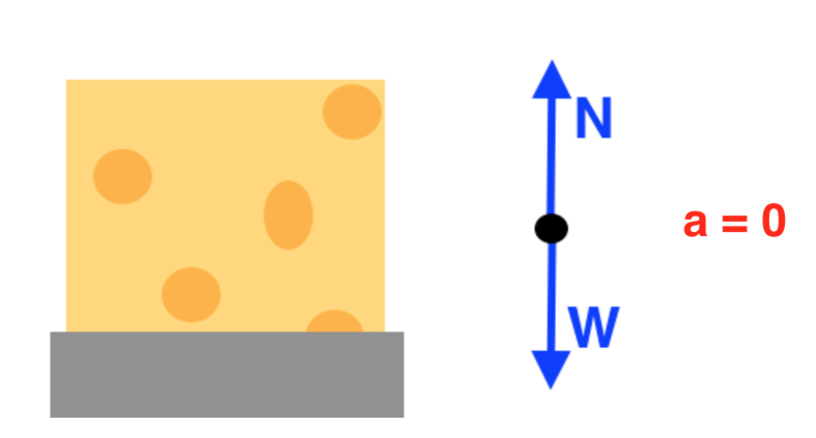



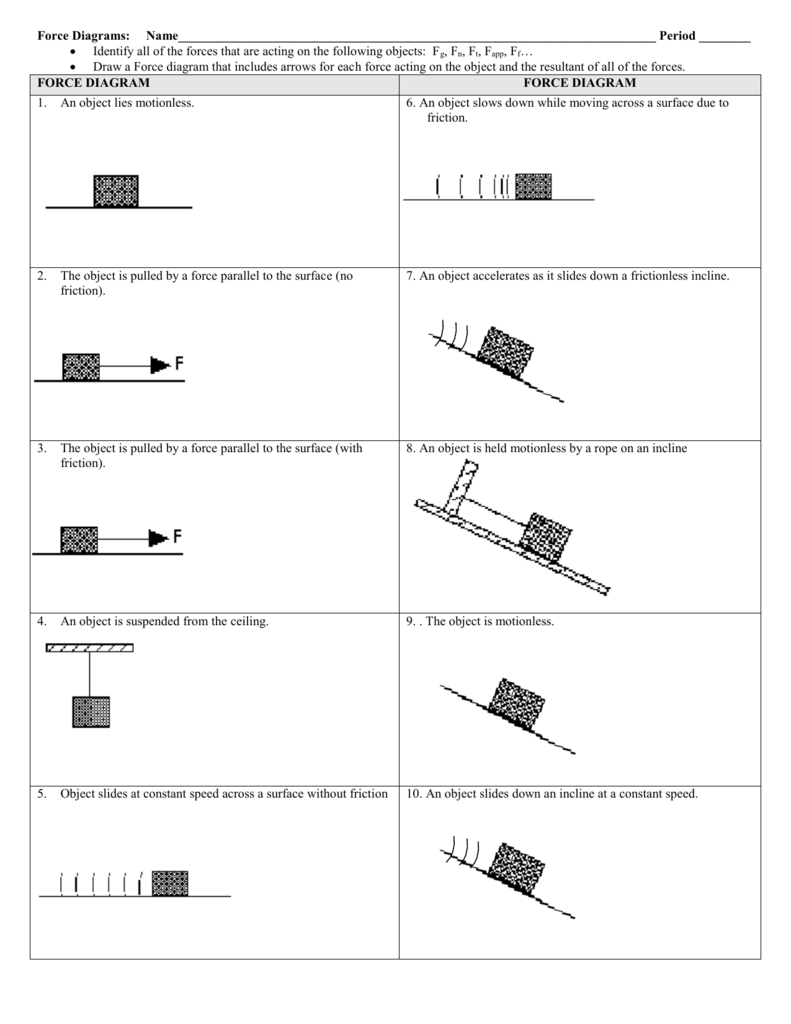
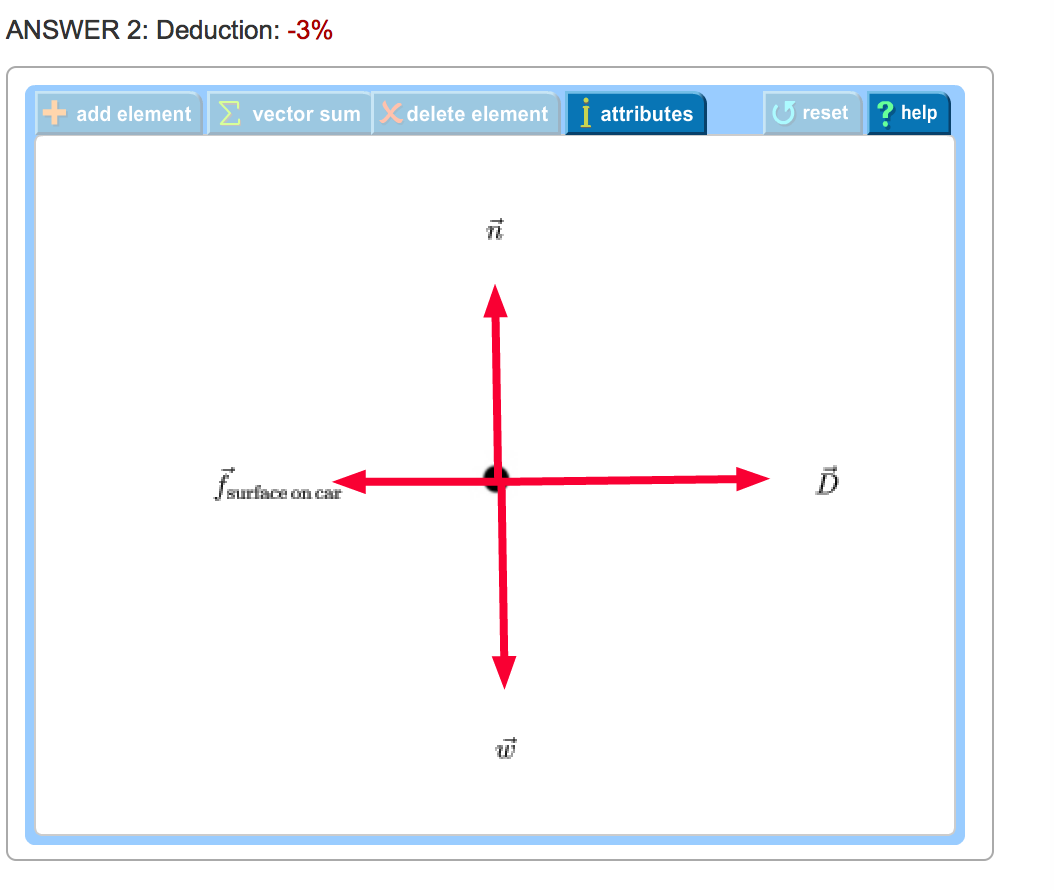




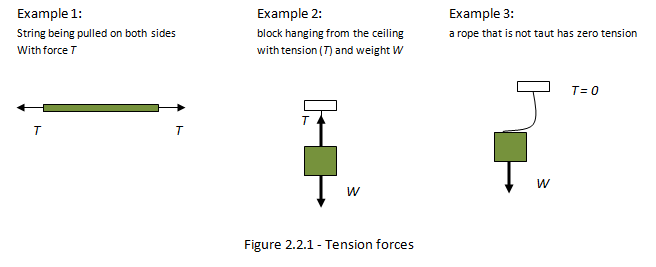


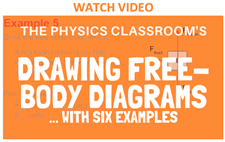
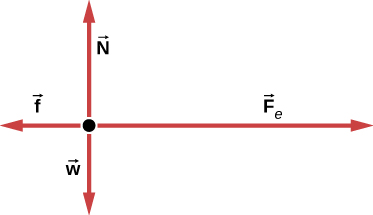
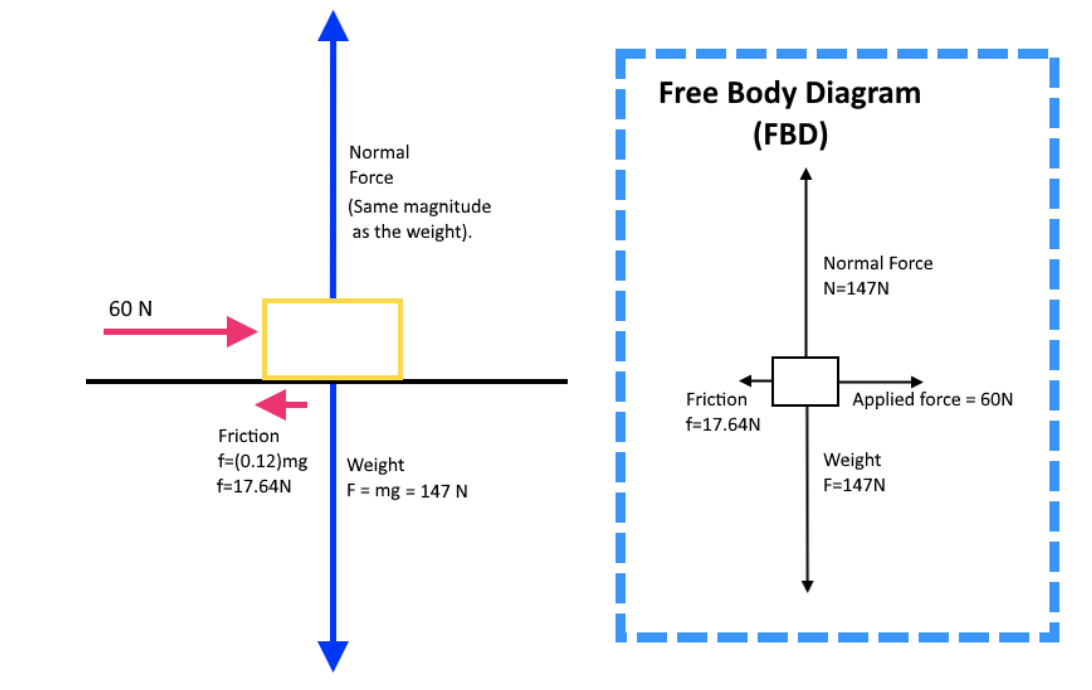
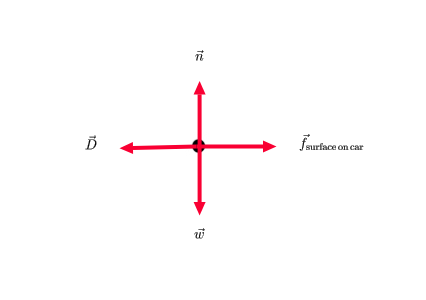


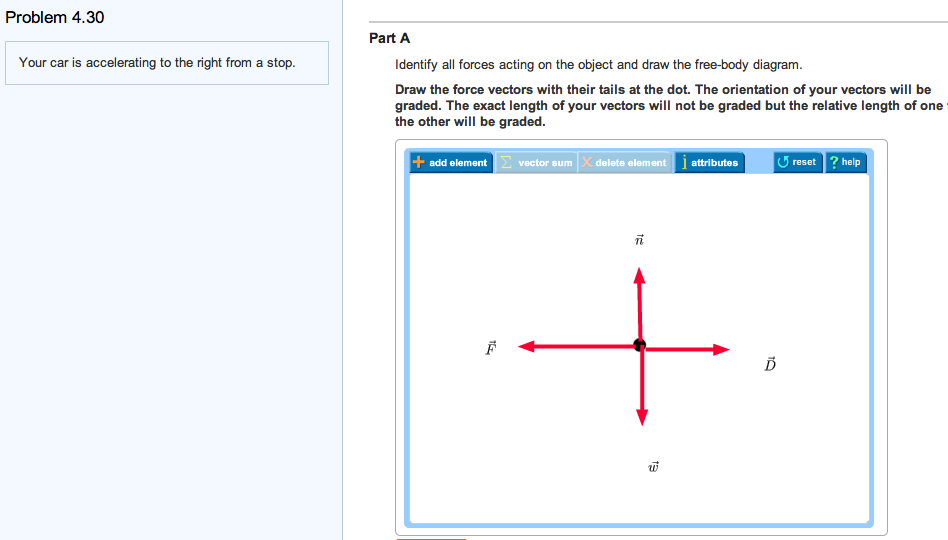



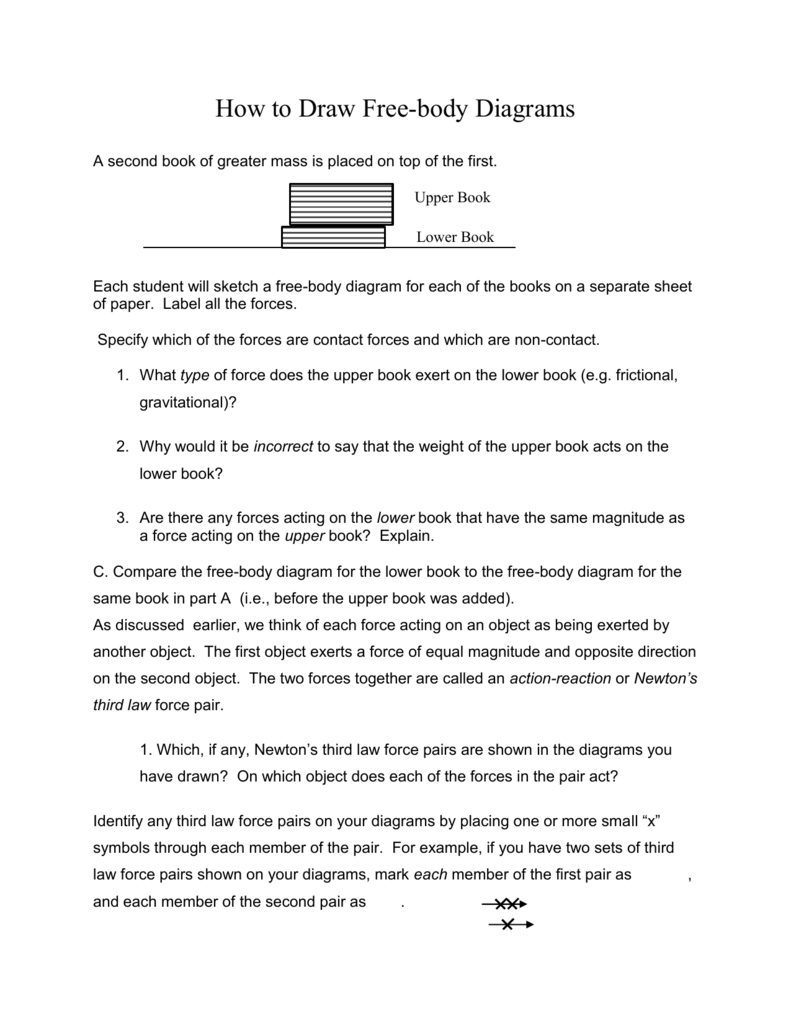
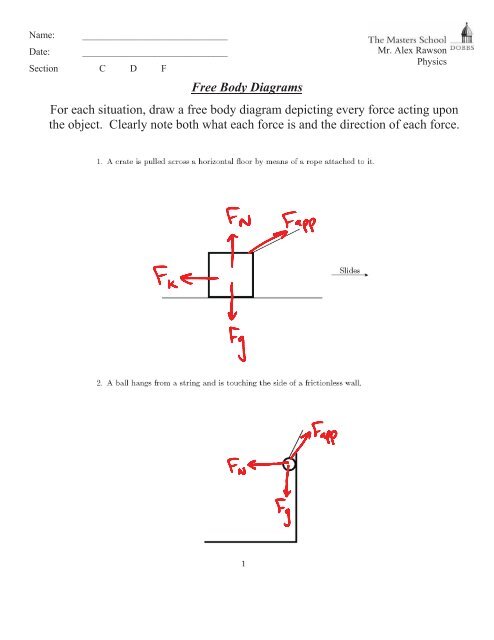
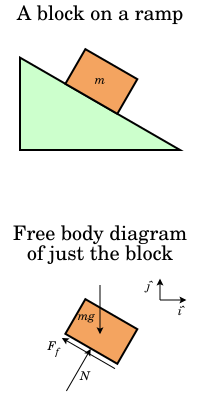
0 Response to "42 identify all forces acting on the object and draw the free-body diagram."
Post a Comment